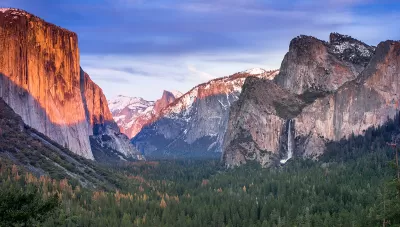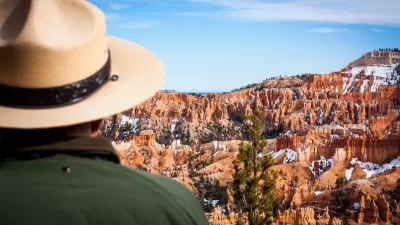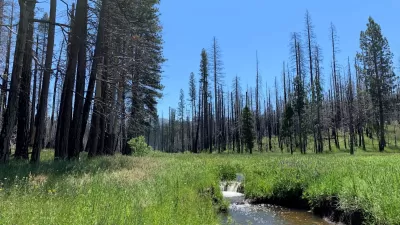A reservation system could help the struggling national parks system manage crowds and protect our public lands from overuse, according to this article.

"America’s national parks face a popularity crisis," writes Michael Childers in MinnPost, and a reservation system—like the one implemented for many parks during the pandemic—could help preserve the lands as intended and make the experience more pleasant for visitors.
The "exponential growth" in many parks' popularity "is generating pollution and putting wildlife at risk to a degree that threatens the future of the park system." As Childers notes, "[p]ark horror stories have grown common in recent years. They include miles-long traffic jams in Yellowstone, three-hour waits to enter Yosemite, trails littered with trash and confrontations between tourists and wildlife."
"The parks are underfunded, overrun, overbuilt and threatened by air and water pollution in violation of the laws and executive orders that protected them," Childers writes. He acknowledges that a reservation system "won’t be a popular solution, since it contradicts the founding premise that national parks were built for public benefit and enjoyment." But to preserve the parks "unimpaired," he argues, "crowd control has become essential in the most popular parks."
Childers also suggests promoting less visited national parks, monuments, and historical sites. "Sites such as Hovenweep National Monument in Colorado and Utah and the Brown v. Board of Education National Historic Site in Kansas deserve attention for their natural beauty and the depth they add to Americans’ shared heritage."
FULL STORY: Overcrowded U.S. national parks need a reservation system

Planetizen Federal Action Tracker
A weekly monitor of how Trump’s orders and actions are impacting planners and planning in America.

Restaurant Patios Were a Pandemic Win — Why Were They so Hard to Keep?
Social distancing requirements and changes in travel patterns prompted cities to pilot new uses for street and sidewalk space. Then it got complicated.

Map: Where Senate Republicans Want to Sell Your Public Lands
For public land advocates, the Senate Republicans’ proposal to sell millions of acres of public land in the West is “the biggest fight of their careers.”

Maui's Vacation Rental Debate Turns Ugly
Verbal attacks, misinformation campaigns and fistfights plague a high-stakes debate to convert thousands of vacation rentals into long-term housing.

San Francisco Suspends Traffic Calming Amidst Record Deaths
Citing “a challenging fiscal landscape,” the city will cease the program on the heels of 42 traffic deaths, including 24 pedestrians.

California Homeless Arrests, Citations Spike After Ruling
An investigation reveals that anti-homeless actions increased up to 500% after Grants Pass v. Johnson — even in cities claiming no policy change.
Urban Design for Planners 1: Software Tools
This six-course series explores essential urban design concepts using open source software and equips planners with the tools they need to participate fully in the urban design process.
Planning for Universal Design
Learn the tools for implementing Universal Design in planning regulations.
Heyer Gruel & Associates PA
JM Goldson LLC
Custer County Colorado
City of Camden Redevelopment Agency
City of Astoria
Transportation Research & Education Center (TREC) at Portland State University
Camden Redevelopment Agency
City of Claremont
Municipality of Princeton (NJ)





























